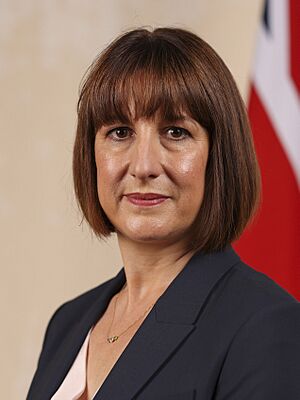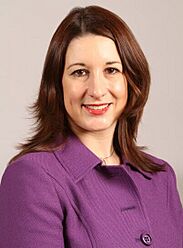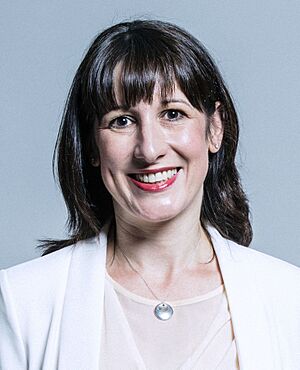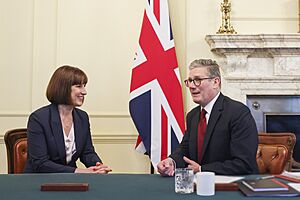Rachel Reeves facts for kids
Quick facts for kids
Rachel Reeves
|
|||||||||||||||
|---|---|---|---|---|---|---|---|---|---|---|---|---|---|---|---|

Official portrait, 2024
|
|||||||||||||||
| Chancellor of the Exchequer | |||||||||||||||
| Assumed office 5 July 2024 |
|||||||||||||||
| Prime Minister | Keir Starmer | ||||||||||||||
| Preceded by | Jeremy Hunt | ||||||||||||||
| Chair of the Business, Energy and Industrial Strategy Committee | |||||||||||||||
| In office 12 July 2017 – 7 April 2020 |
|||||||||||||||
| Preceded by | Iain Wright | ||||||||||||||
| Succeeded by | Darren Jones | ||||||||||||||
|
|||||||||||||||
| Member of Parliament for Leeds West and Pudsey Leeds West (2010–2024) |
|||||||||||||||
| Assumed office 6 May 2010 |
|||||||||||||||
| Preceded by | John Battle | ||||||||||||||
| Majority | 12,392 (32.2%) | ||||||||||||||
| Personal details | |||||||||||||||
| Born |
Rachel Jane Reeves
13 February 1979 Lewisham, London, England |
||||||||||||||
| Political party | Labour | ||||||||||||||
| Spouse | Nicholas Joicey | ||||||||||||||
| Children | 2 | ||||||||||||||
| Relatives | Ellie Reeves (sister) | ||||||||||||||
| Residences | 11 Downing Street, London | ||||||||||||||
| Alma mater | |||||||||||||||
| Signature |  |
||||||||||||||
Rachel Jane Reeves (born 13 February 1979) is a British politician who has served as Chancellor of the Exchequer since July 2024. A member of the Labour Party, she is the first female chancellor in British history. She has been Member of Parliament (MP) for Leeds West and Pudsey, previously Leeds West, since 2010.
Joining the Labour Party as a teenager, Reeves studied at New College, Oxford, and the London School of Economics before working at the Bank of England and then HBOS. Elected at the 2010 general election, she served in Ed Miliband's Shadow Cabinet as Shadow Chief Secretary to the Treasury from 2011 to 2013 and Shadow Secretary of State for Work and Pensions from 2013 to 2015. Reeves spent the duration of Jeremy Corbyn's leadership on the backbenches and served as chair of the Business, Energy and Industrial Strategy Committee from 2017 to 2020.
After Sir Keir Starmer was elected as leader in 2020, he appointed Reeves Shadow Chancellor of the Duchy of Lancaster and Shadow Minister for the Cabinet Office, shadowing Michael Gove. In May 2021 Reeves replaced Anneliese Dodds as Shadow Chancellor of the Exchequer. In this role she adhered to "modern supply-side economics", an economic policy that focuses on infrastructure, education and labour supply by rejecting tax cuts and deregulation. It is heavily inspired by Joe Biden's economic policy, particularly his Inflation Reduction Act. She coined the term "securonomics" in 2023 to refer to her version of this economic policy.
Following Labour's landslide victory in the 2024 general election, Reeves assumed the role of Chancellor, taking over from Jeremy Hunt. She is the first woman to hold the position. On taking office Reeves stated that since there is "not a huge amount of money" her focus will be on "unlocking" private-sector investment, as she believes "private-sector investment is the lifeblood of a successful economy."
Contents
Early life and career
Rachel Jane Reeves was born on 13 February 1979 in the London Borough of Lewisham, the daughter of teachers. She was educated at the comprehensive Cator Park School for Girls in Beckenham. While at secondary school she won a British Under-14 girls chess championship title in a tournament organised by the now-defunct British Women's Chess Association. After sitting A-Levels in politics, economics, mathematics and further mathematics, she read philosophy, politics and economics at New College, Oxford (Bachelor of Arts), achieving a 2:1. She then obtained an MSc in economics from the London School of Economics.
Reeves's first job after leaving university was with the Bank of England. She moved to Leeds in 2006 to work for the retail arm of HBOS. She was once interviewed for a job at Goldman Sachs but turned it down despite claiming that the job could have made her "a lot richer".
Reeves cites the influence of her father on her and her sister Ellie Reeves MP’s socially democratic politics. She recalls how, when she was eight years old, her father, Graham, pointed out the then Labour Party leader Neil Kinnock on the television and "told us that was who we voted for". Reeves says she and her sister have "both known we were Labour since then". She joined the Labour Party at the age of sixteen.
Political career
Member of Parliament
Reeves stood as the Labour Party parliamentary candidate in the Conservative safe seat of Bromley and Chislehurst at the 2005 general election, finishing second behind the sitting Conservative Party MP Eric Forth. Following Forth's death in 2006, she also contested the 2006 by-election, and finished in fourth place. Labour support fell from 10,241 votes to 1,925, in what was described as a "humiliation" for Labour. The result was the worst performance for a governing party since 1991.
Reeves later sought nomination for the Leeds West seat at the 2010 general election, seeking to replace John Battle, who had chosen to retire. She was selected to contest the seat from an all-women shortlist of Labour Party prospective parliamentary candidates. She was elected with a majority of 7,016 on 6 May 2010 – a 5,794 reduction in the majority enjoyed by Battle.
Shadow portfolios
Following the 2010 election, Reeves supported Ed Miliband for the Labour leadership because she felt he was the candidate most willing to listen to what the voters were saying about where the party went wrong. After becoming an MP, Reeves was appointed to the Department for Business, Innovation and Skills Select Committee then as Shadow Pensions Minister in October 2010. In her role as Shadow Pensions Minister, she campaigned against the Government's proposed acceleration of equalising state pensions ages for men and women. She was promoted to the post of Shadow Chief Secretary to the Treasury in October 2011.
Appointed Shadow Secretary of State for Work and Pensions in 2013, Reeves proposed that anyone unemployed for two years, or one year if under 25 years old, would be required to take a guaranteed job or lose access to benefits. This caused controversy within the Labour Party, and Reeves also stated that Labour would be "tougher" than the Conservative Party in cutting the benefits bill. She caused further controversy in early 2015 by stating "We [Labour] don't want to be seen as, and we're not, the party to represent those who are out of work".
Reeves was re-elected at the 2015 general election with an increased vote share of 48.0% and an increased majority of 10,727.
Following Jeremy Corbyn's election as leader in 2015, Reeves supported Owen Smith in the 2016 Labour Party leadership election. In September 2016, Reeves described her constituency as being "like a tinderbox" that could explode if immigration was not curbed.
At the snap 2017 general election, Reeves was again re-elected with an increased vote share of 63.9% and an increased majority of 15,965. She was again re-elected at the 2019 general election, this time with a decreased vote share of 55.1% and a decreased majority of 10,564.
When Keir Starmer became Labour leader in 2020, Reeves was appointed as Shadow Chancellor of the Duchy of Lancaster, with responsibility for Labour's response to Brexit and shadowing Michael Gove.
Shadow Chancellor of the Exchequer
Reeves moved into the role of Shadow Chancellor of the Exchequer in a shadow cabinet reshuffle on 9 May 2021, replacing Anneliese Dodds.
In December 2021, Reeves said she would support a 2p cut to the Income Tax basic rate, if the Conservatives proposed that. She opposed the planned 1.2% rise in National Insurance rates. Reeves said Labour planned to replace business rates with a new system that charged shops fairly compared to larger online businesses.
In an interview with the Financial Times, outlining her forthcoming speech in Bury on strengthening the economy, Reeves said a Starmer government would be pro-business and committed to fiscal discipline. She said Britain had seen Japanese-style Lost Decades of growth, which she said a Labour government would reverse through following fiscal rules and eliminating borrowing for day-to-day spending, with no unfunded election spending commitments. This she said would enable government capital spending, above the current 3% of GDP per year limit, to promote growth. Labour would be both pro-worker and pro-business. Reeves did not think Britain would rejoin European Union or its single market in the next 50 years. She said she was against the return of freedom of movement for workers between the UK and EU. Reeves also said that the falling membership of the Labour Party was a good thing, as it was shedding unwelcome supporters.
In her speech in Bury on 20 January 2022, where she was introduced by MP Christian Wakeford who had recently defected to Labour from the Conservatives, she added more detail to her plan:
- A £28 billion per year climate investment plan, which would create UK based jobs and support battery manufacturing, hydrogen power, offshore wind, tree planting, flood defences and home insulation (which has since been backtracked on);
- A target of creating 100,000 new businesses over five years;
- Mutual recognition of professional qualifications with the EU;
- Veterinary agreements to help the food and drink industry;
- Restore visa-free touring for musicians.
In 2023, after the Labour Party dropped its pledge to scrap university tuition fees, Reeves said "the circumstances since [Starmer] became leader have changed significantly" and blamed the Conservative government's handling of the economy for the policy shift.
In September 2023, openDemocracy reported that Reeves, alongside Peter Kyle, Wes Streeting and Yvette Cooper, received large private donations from wealthy financiers. The article also stated that, "There is no suggestion of impropriety here" as they "genuinely believe in policies that are good for their banker backers". Later that month, Reeves was ranked number one in the New Statesman's Left Power List 2023, above Keir Starmer, which described her as "the most influential person on the British left today".
On 31 January 2024, Reeves announced that Labour would not reintroduce a cap on bankers' bonuses, despite having questioned why the cap was being removed by the Conservatives in October 2023. The decision was linked to large inflows of money into the Labour Party from global banks, professional services firms, consultancies and financiers since 2022. The next day Reeves announced that Labour would not raise corporation tax in the next parliament if it got into power.
On 8 February 2024, Starmer and Reeves announced that the £28 billion per year climate investment policy, seen as Labour's central economic and environmental policy, would be halved with two-thirds of that being existing spending. This reduction of investment was in response to the economic situation with higher interest rates, and to prevent Conservative criticism in the forthcoming general election. Reeves said "We want to bring jobs to Britain, to bring energy bills down, to boost our energy security, and also to decarbonise the economy ... If you don't need to spend £28 billion in doing that, that's great". The home insulation grants part of the policy would be most heavily curtailed, to protect schemes such as a publicly owned Great British Energy clean energy company and a sovereign wealth fund. Later that month, The Telegraph reported that Reeves had accepted a £10,100 donation from Bernard Donoughue, a climate sceptic Labour peer, days before Labour abandoned its flagship £28 billion green energy spending pledge. Lord Donoughue told The Telegraph that the donation was “totally unrelated” to the spending pledge.
According to documentation made public on a Labour website, Labour plans for the UK Strategic Development Sovereign Wealth Fund Reeves is spearheading include incubators, accelerators and business hubs, as well as seed funding for UK startups and series A, B and C funding for established businesses of varying sizes.
Securonomics
Since 2022, Reeves has adhered to "modern supply-side economics", an economic policy which focuses on infrastructure, education and labour supply by rejecting tax cuts and deregulation. In May 2023, Reeves coined the term "securonomics" to refer to her version of this economic policy, originally in a public address at the Peterson Institute for International Economics. It is heavily inspired by US president Joe Biden's economic policy, particularly his Inflation Reduction Act. Securonomics is based on the belief that globalisation has failed to achieve its stated aims and that economies in the Western world must adapt in response. It would involve a productivist "active state" taking a more active role in managing the free-market economy, boosting production and drawing up industrial policy, stronger supply chains, and more economic cooperation with international allies with similar economic goals. Reeves believes that the active state is part of an "emerging global consensus" led by Biden's administration which will replace the neoliberal economic consensus, and that economic policy must be driven by the need for security.
In an interview with the Financial Times in May 2023, Reeves said securonomics had to be based on "the rock of fiscal responsibility". She said her proposed £28 billion climate investment plan, Labour's version of the Inflation Reduction Act, had to "fit within her fiscal rules". In June 2023, the investment plan was revised to a gradual roll-out where the annual investment would rise gradually to £28 billion by around 2027. She argued that following the economic impact of the 2021–2023 global energy crisis, food price crisis and the Truss government's "mini-budget", the plan "will only be possible if we have an iron grip on public spending and tax receipts". The New Statesman reported that in an interview Reeves said "a Labour government would not introduce annual wealth and land taxes; raise income tax; equalise capital gains rates and income tax; rejoin the European single market and customs union; change the Bank of England's inflation target and reform its rigid mandate; or take private utilities into public ownership, except for the railways".
Chancellor of the Exchequer
Following Labour's landslide victory in the 2024 general election, Reeves was appointed as Chancellor of the Exchequer. She became the first woman to hold the office of Chancellor in its 708-year history. On taking office Reeves stated that since there is "not a huge amount of money" her focus will be on "unlocking" private-sector investment, as she believes "private-sector investment is the lifeblood of a successful economy."
Political positions and views
Reeves has written studies on the financial crisis of 2007–2008 for the Fabian Review, the Institute of Public Policy Research, the Socialist Environment and Resources Association, and the European Journal of Political Economy. In an article for Renewal entitled "The Politics of Deficit Reduction", Reeves offers her critique of the then-current financial situation and efforts to bring down the budget deficit. Reeves was a proponent of quantitative easing in 2009, to alleviate the Great Recession having studied the effects of the policy on Japan in the early 2000s.
Reeves supports the High Speed 2 rail project, and raised the issue in the House of Commons, as well as campaigning for the proposed Kirkstall Forge railway station. In 2008, she was involved in the campaign to save the historic Bramley Baths.
Reeves is a vice-chair of Labour Friends of Israel, contributed a chapter to a book about Israeli politics and society, and supports the Auschwitz-Birkenau Foundation.
Writing
Echoing similar titles of publications by Roy Jenkins in 1959 and Tony Wright in 1997, Reeves wrote the new edition of Why Vote Labour? in the run-up to the 2010 general election, as part of a series giving the case for each of the main political parties.
Her biography of the Labour politician Alice Bacon, Baroness Bacon (1909–1993), titled Alice in Westminster: The Political Life of Alice Bacon, was published in 2017. Bacon was the first and previously only woman to represent a Leeds constituency, having represented Leeds North East and then Leeds South East between 1945 and 1970.
In October 2023, Reeves' book The Women Who Made Modern Economics was published. The Guardian said the book contained "something much more like the outlines of a coherent political project ... than Labour is sometimes credited with". The Financial Times reported that the book "lifted" content from Wikipedia, The Guardian and other sources, identifying over twenty examples of apparent plagiarism in the book, including entire paragraphs. Reeves told BBC News that some sentences "were not properly referenced" and this would be corrected in future reprints.
Honours
In June 2023, it was announced that Reeves was elected an Honorary Fellow of New College, Oxford.
Personal life
Reeves is married to Nicholas Joicey, a civil servant and Gordon Brown's former private secretary and speech writer. The couple have homes in Leeds (Bramley) and London. Reeves announced her first pregnancy on 20 September 2012 and gave birth to a daughter, and in 2015 to a son.
She is a practising Christian, although during the 2024 election campaign she publicly apologised to her vicar for her recent absence from church, saying "I've been quite busy."
Rachel's younger sister, Ellie, was the Labour MP for Lewisham West and Penge until the 2024 general election and was elected in the new seat of Lewisham West and East Dulwich, which replaced it. Ellie Reeves is married to John Cryer, Labour MP for Leyton and Wanstead.
See also
 In Spanish: Rachel Reeves para niños
In Spanish: Rachel Reeves para niños




